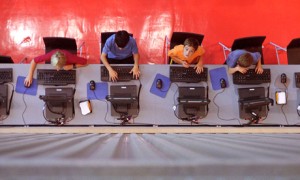 “Your child,” says the executive director of a national sex-education organization, “is going to look at porn at some point. It’s inevitable.”
“Your child,” says the executive director of a national sex-education organization, “is going to look at porn at some point. It’s inevitable.”
The first woman I saw bare-breasted, her legs splayed for the pleasure of men, was posed in the slick pages of a magazine stashed in my stepfather’s dresser drawer. He kept this woman and others like her hidden, but not well enough. Often when I was alone, I would go into that darkness to see what lay there. I was twelve years old.
Some boys in my neighborhood stashed dirty pictures (despite our ignorance we knew that was what to call them, though these fantasy women were smooth and unblemished) in the hollowed center of an old cable spool that rotted at the edge of our subdivision. This became a sort of library. We were twelve and thirteen and fourteen. Some of us were younger.
“It’s inevitable.”
Perhaps this was true even when I was a child; it certainly seems true now, when so many of our children can access the internet unattended at their friends’ houses, in the privacy of their bedrooms, on the tailored screens of their hand-held devices. Two of my sons have reached the ages of the boys who crept to the edge of our neighborhood when we craved more.
My younger two sons, meanwhile, are the ages of children I know about, whose parents let them get on the computer as part of a wildlife study. You have to understand, if you would track animals, the differences in their scat. These parents did not realize that some people derive pleasure from shitting on one another and putting pictures of their exploits online.
How do you explain to your seven year-old why someone would shit in someone else’s mouth? Perhaps, in twenty years, some enlightened therapist in a national sex-education organization will reassure us that seeing such things is inevitable. Perhaps he can offer downloadable guides to help parents talk to our children about this in a healthy clinical manner. Perhaps while he is at it, he can help us talk to our children about butt plugs and choking and furry fandom, and suggest hygienic methods of being pissed on.
There is a wide gulf between scat play and blowjobs, of course, and only a curmudgeonly traditionalist imagines we are not all hardwired into our sexual slots, with a permanent bell curve of normalcy in the center and perversions at the tails. Only a theocratic alarmist would claim instead that any one of us is capable of sliding deeper into darkness, that Eros unbounded becomes a slave driver, and the only salve for his lashes is titillation. Only a protective busybody would assert that the eyes are the windows to the soul, and that the souls of children must be guarded.
No, our brave new world depends on the hardwired hard-on. Boys want what boys want, and mostly they want to see women’s breasts, though sometimes they want boys and sometimes they want to dress up like a cat and be degraded by older men. Whatever they want, we should take care not to shame them for it, or deceive ourselves that they can be deterred, and in fact should ourselves be ashamed if our impulse is to deter them.
And if what they see is not what they want, we should learn to have a good laugh with them when they stumble across those images, because, well, they’re bound to see it sooner or later, so why traumatize them by making a fuss?
This is very convenient for the modern pornographer, be he the aggregator of shot-in-a-basement amateur porn, or the violence-besotted Quentin Tarantino, or an overseer of last year’s Macy’s Thanksgiving Parade, who found unobjectionable a dance number featuring transvestites in hooker boots. Why should anyone feel responsibility for what he spews out into the world, if children are bound to see it anyway?
How convenient for parents as well, we who rely on the digital screen to entertain our children when we are tired, we who perhaps indulge on occasion our own hunger for titillation, who dutifully remember, when we see our daughters invited to do strip-tease numbers as cheerleaders, our sons enticed to play first-person shooter games where heads explode and victors exult over corpses, that every generation before us has worried that we are crossing a civilizational line that may be our undoing, yet things have turned out Just Fine.
I don’t know what portion of children have had pornographic images seared into their memories, whether of sex or violence or the commingling of the two. Of those who labor under that weight, I don’t know how many have their subsequent relationships impaired. There is no accounting for this. We don’t want an accounting.
The bill comes due regardless. I could tell you of the bills I’ve paid. I promise you that you know men, women, and children—many more than perhaps you realize—who could recount for you the bills they, too, have paid. There is no federal policy that will fix it. And God help me as a father, I don’t believe I can protect these children of mine on my own.
“It is the community,” writes Wendell Berry, that must protect “the childhood of children…for they can be protected only by affection and by intimate knowledge, which are beyond the capacities of the public and beyond the power of the private citizen.”
There’s wisdom here, though I can’t yet piece together what it means for the liturgy of our daily lives. Unplug our TV? Smash that goddamned cable box where it sits blinking in a corner, and convince all our neighbors to do the same? I don’t know. I only know what my gut tells me, which is that we’d better figure something out, and soon.
Tony Woodlief lives in North Carolina. His essays have appeared in The Wall Street Journal andThe London Times, and his short stories, two of which have been nominated for Pushcart prizes, have been published in Image, Ruminate, and Saint Katherine Review. His website is www.tonywoodlief.com.











